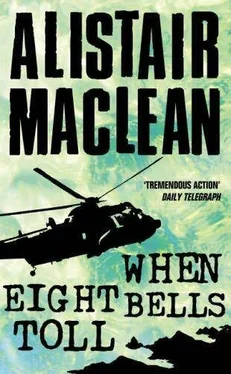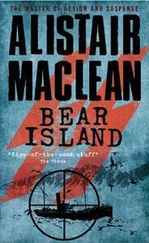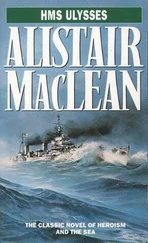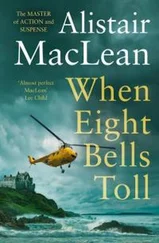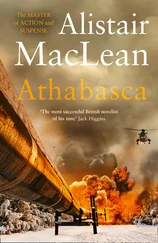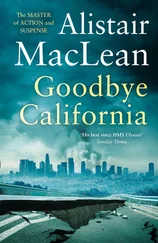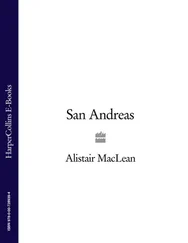I felt my hands — already puffed and numbed by the icy water — touch a life-line and air-line and quickly withdrew them. Below and to my right I could see another faint pool of light. A few cautious strokes and I could see the source of the light.
The light was moving. It was moving because it was attached to the helmet of a diver, angled so as to point down at an angle of forty-five degrees. The diver was inside the a strong-room.
They hadn't opened that strong-room with any Yale key. They'd opened it with underwater torches cutting out a roughly rectangular section in the strongroom's side, maybe six feet by four.
I moved up to this opening and pushed my head round the side. Beyond the now stooping diver was another light suspended from the deckhead. The bullion boxes were neatly stacked in racks round the side and it was a five-second job to estimate their number. Of the three hundred and sixty bullion boxes, there were about one hundred and twenty left. Something brushed my arm, pulled past my arm. I glanced down and saw that it was a rope, a nylon line, that the diver was pulling in to attach to the handle of one of the boxes. I moved my arm quickly out of the way.
His back was towards me. He was having difficulty in fastening the rope but finally secured it with two half hitches, straightened and pulled a knife from his waist sheath. I wondered what the knife was for.
I found out what the knife was for. The knife was for me. Stooped over as he had been, he could just possibly have caught a glimpse of me from the corner of his eye: or he might have felt the sudden pressure, then release of pressure, on the nylon rope: or his sixth sense was in better working condition than mine. I won't say he whirled round, for in a heavy diving suit at that depth the tempo of movement becomes slowed down to that of a slow-motion film.
But he moved too quickly for me. It wasn't my body that was slowing down as much as my mind. He was completely round and facing me, not four feet away, and I was still where I'd been when he'd first moved, still displaying all the lightning reactions and coordinated activity of a bag of cement. The six-inch-bladed knife was held in his lowered hand with thumb and forefinger towards me, which is the way that only nasty people with lethal matters on their minds hold knives, and I could see his face dearly. God knows what he wanted the knife for, it must have been a reflex action, he didn't require a knife to deal with me, he wouldn't have required a knife to deal with two of me.
It was Quinn.
I watched his face with a strangely paralysed intentness, I watched his face to see if the head would jerk -down to press the telephone call-up buzzer with his chin. But his head didn't move, Quinn had never required any help in his life and he didn't require any now. Instead his lips parted in a smile of almost beatific joy. My mask made it almost impossible for my face to be recognised but he knew whom he had, he knew whom he had without any doubt in the world. He had the face of a man in the moment of supreme religious ecstasy. He fell slowly forwards, his knees bending, till he was at an angle of almost forty-five degrees and launched himself forward his right arm already swinging far behind his back.
The moment of thrall ended. I thrust off backwards from the strong-room's outer wall with my left foot, saw the air-hose come looping down towards me as Quinn came through the jagged hole, caught it and jerked down with all ray strength to pull him off-balance, A sharp stinging pain burned its way upwards from my lower ribs to my right shoulders. I felt a sudden jerk in my right hand. I fell backwards on to the floor of the hold and then I couldn't see Quinn any more, not because the fall had dazed me nor because Quinn had moved, but because he had vanished in the heart of an opaque, boiling, mushrooming cloud of dense air-bubbles. A non-collapsible air-hose can, and often has to, stand up to some pretty savage treatment, but it can't stand up to the wickedly slicing power of a razor-sharp knife in the hands of the strongest man I'd ever known. Quinn had cut his own air-hose, had slashed it cleanly in two.
No power on earth, could save Quinn now. With a pressure of forty pounds to the -square inch on that severed air-line, he would be drowning already, his suit filling up with water and weighting him down so that he could never rise again. Almost without realising what I was doing I advanced with the nylon rope still in my hands and coiled it any old way round the madly threshing legs, taking great care indeed to keep clear of those flailing arms, for Quinn could still have taken me with him, could have snapped my neck like a rotten stick. At the back of my mind I had the vague hope that when his comrades investigated, as they were bound to do immediately -those great clouds of bubbles must have already passed out through the hold on their way to the surface- they would think he'd become entangled and tried to cut himself free. I did not think it a callous action then nor do I now. I had no qualms about doing this to a dying man, and no compunction: he was doomed anyway, he was a psychopathic monster who killed for the love of it and, most of all. I had to think of the living who might die, the prisoners in the cellars of the Dubh Sgeir castle. I left him threshing there, dying there, and swam up and hid under the deck-head of the hold.
The two men who had been on deck were already on their way down, being slowly lowered on their life-lines. As soon as their helmets sunk below my level I came up through the hatchway, located the wire hawser and made my way up. I'd been down for just under ten minutes so when my wrist depth-gauge showed a depth of two fathoms I stopped for a three-minute decompression period. By now, Quinn would be dead.
I did as Hutchinson had told me, drifted my way back to the Firecrest — there was no hurry now — and located it without difficulty. Hutchinson was there to help me out of the water and I was glad of his help.
"Am I glad to see you, brother," he said. "Never thought the day would come when Tim Hutchinson would die a thousand deaths, but die a thousand deaths he did. How did it go?"
"All right. We've time. Five or six hours yet."
"I'll get the hook up." Three minutes later we were on our way and three minutes after that we were out near enough in the mid-channel of the Beul nan Uamh, heading north-north-east against the gathering ebb. I could hear the helm going on auto-pilot and then Hutchinson came through the door into the lit saloon, curtains tightly if, in that fog, unnecessarily drawn, where I was rendering some first aid to myself, just beginning to tape up a patch of gauze over the ugly gash that stretched all the way from lowest rib to shoulder. I couldn't see the expression behind the darkly-luxuriant foliage of that beard, but his sudden immobility was expression enough. He said, quietly: "What happened, Calvert?"
"Quinn. I met him in the strong-room of the Nantesville."
He moved forward and in silence helped me to tape up the gauze. When it was finished, and not until then, he said: "Quinn is dead." It wasn't a question.
"Quinn is dead. He cut his own air-hose." I told him what had happened and he said nothing. He didn't exchange a dozen words all the way back to Craigmore, I knew he didn't believe me. I knew be never would.
Neither did Uncle Arthur. He'd never believe me till the day he died. But his reaction was quite different, it was one of profound satisfaction. Uncle Arthur was, in his own, avuncular fashion, possessed of an absolute ruthlessness. Indeed, be seemed to take half the credit for the alleged execution. "It's not twenty-four hours," he'd announced at the tea-table, "since I told Calvert to seek out and destroy this man by whatever means that came to hand. I must confess that I never thought the means would consist of the blade of a sharp knife against an air-hose. A neat touch, my boy, a very neat touch indeed."
Читать дальше
Конец ознакомительного отрывка
Купить книгу
